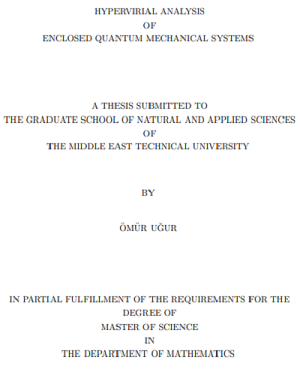Ömür Uğur
M.Sc., Department of Mathematics
April 1998
Supervisor: Prof. Dr. Hasan Taşeli (Department Mathematics, Middle East Technical University, Ankara)
Abstract
The energy eigenvalues of harmonic and anharmonic oscillators in a box are obtained through the Rayleigh-Schrödinger perturbative expansion and inner product perturbative expansion which uses hypervirial and Hellmann-Feynman theorems, taking the free particle in a box as the unperturbed system. The perturbative series are shown to be convergent for small boxes by the help of Rellich’s theorem and upper and lower bounds for the energy eigenvalues of a quantum mechanical system are analysed through H. Taşeli’s works. Numerical comparison with the exact eigenvalues — which are obtained by constructing, and diagonalizing the Hamiltonian in the basis of the eigenfunctions of the particle in a box — corroborates the accuracy and range of validity of the approximate solutions, particularly the convergence and the radius of convergence of the perturbative energy series.
The eigenvalues of the Schrödinger equation with a polynomial potential are calculated accurately by means of the Rayleigh-Schrödinger perturbation method up to any order. For the unperturbed problem, the particle in a box is chosen so that the trigonometric basis functions are to satisfy Dirichlet boundary conditions. It is also shown that the set of trigonometric basis functions has the capacity of yielding the energy spectra of unbounded problem, without loss of convergence provided that the Padé-approximants are used for large boxes.
Diagonal hypervirial relations are also applied to enclosed quantum mechanical systems when wave function obey Dirichlet type boundary conditions. A general formula for the energy eigenvalues is derived, showing a striking difference with the usual problem over an infinite domain. This formula, obtained for Dirichlet boundary conditions generalizes the usual hypervirial and virial theorems. However, the enclosed quantum mechanical system can be used to characterize the eigenvalues of the system over the infinite domain.
Keywords: eigenvalue perturbation, Hellmann-Feynman theorem, hypervirial theorem, Padé-approximants, quantum mechanical systems, Schrödinger equation
